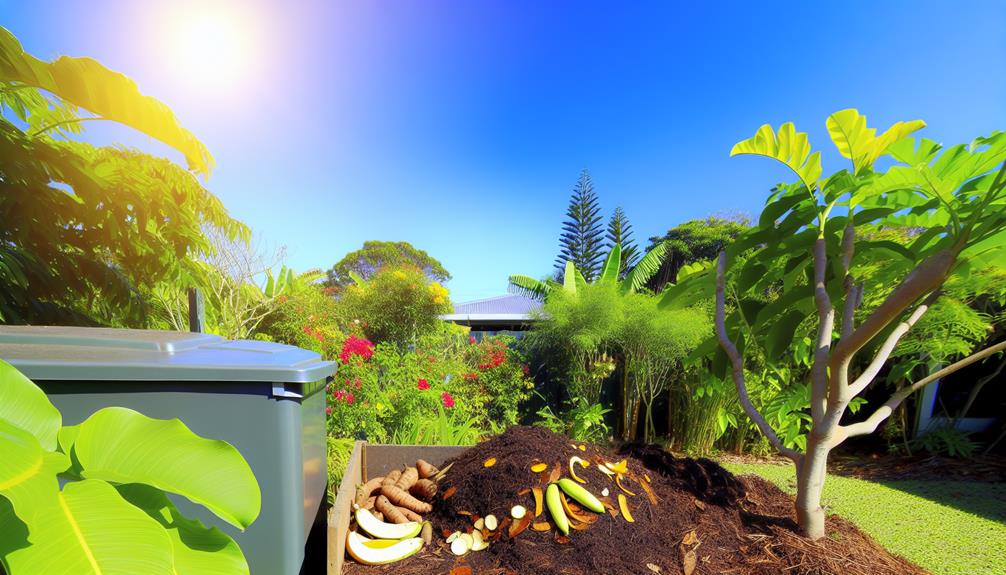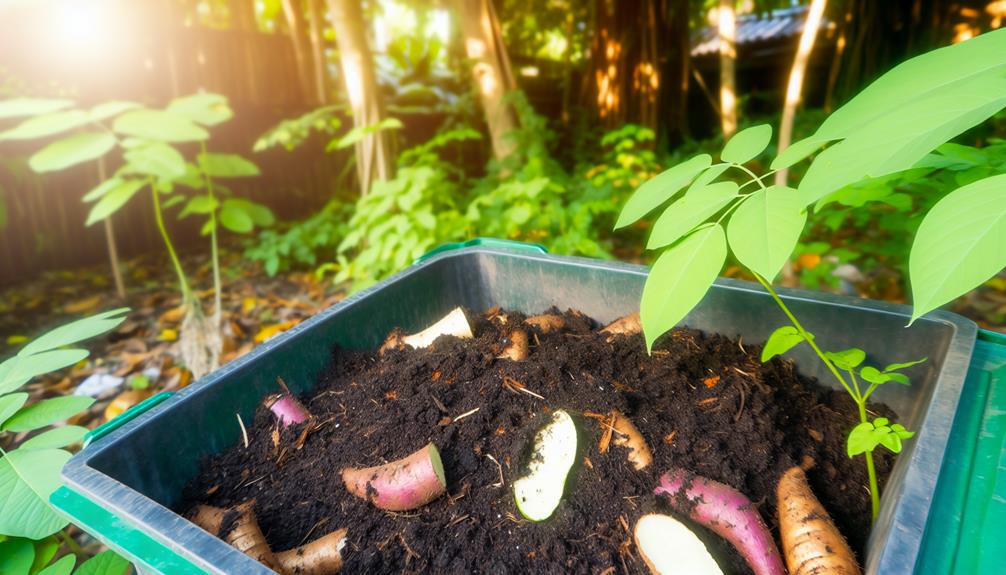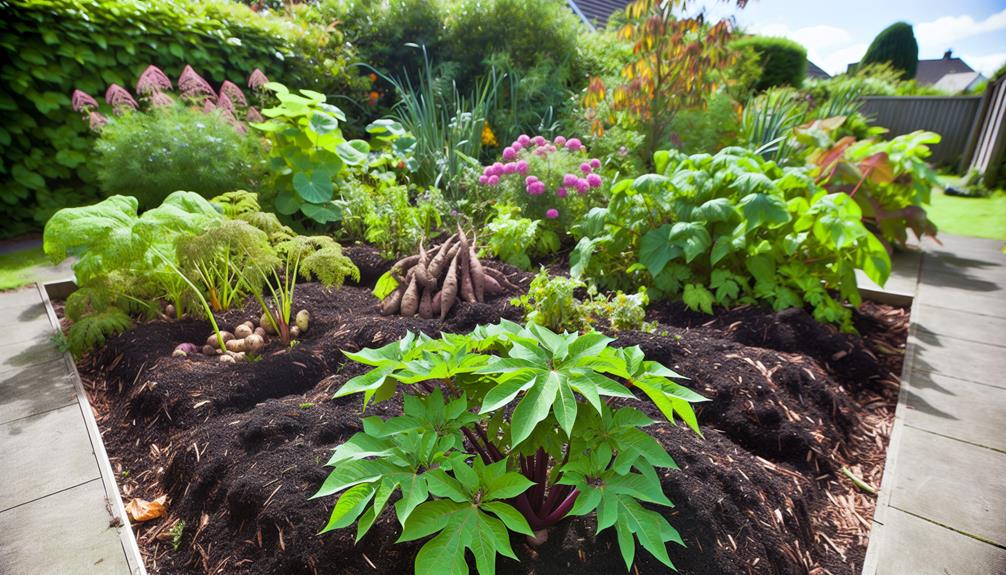

You can definitely compost yams to enrich your soil with essential nutrients. Start by chopping the yams into smaller pieces using a sharp knife, and spread them evenly in your compost bin. You can peel them or keep the skins on. Mix the yam pieces with other food scraps for a balanced compost.
Guarantee proper moisture levels, regularly turn the compost for aeration, and monitor the temperature. Avoid common mistakes like improper layering and excessive moisture. Once the compost is ready, use it to top dress plants, mix into garden soil, or create compost tea. There’s plenty more to discover.
Composting yams can greatly enrich your soil, providing essential nutrients for healthier plant growth. When you add yams to your compost pile, they break down and release a wealth of organic matter, which acts as a nutrient boost for your soil. This process supports soil health by enhancing its structure and increasing its ability to retain moisture. Your plants will thrive in this enriched environment, leading to more robust growth and higher yields.
To maximize the benefits, make sure your compost pile includes a balanced mix of green and brown materials. Yams, rich in carbohydrates, fall into the ‘green’ category and should be complemented with ‘brown’ materials like dried leaves or straw to promote efficient decomposition. Regularly turning your compost ensures even breakdown and prevents any unpleasant odors.
You’ll find that incorporating composted yams into your gardening routine fosters a sense of community with other eco-conscious gardeners. By sharing tips and experiences, you’ll not only improve your own garden but also contribute to a collective effort towards sustainable gardening practices. Embrace the nutrient boost from composting yams and watch your garden flourish like never before.
Also Read: Can You Compost Barbecue Sauce?
To prepare yams for compost, start by chopping them into smaller pieces to expedite the decomposition process. Cutting yams into smaller chunks increases the surface area, allowing microbes to break them down more efficiently. Use a sharp knife for safety and precision.
Peeling yams is optional. If you choose to peel them, keep the peels—they’re great for compost too. The skins are rich in nutrients that can enrich your compost pile. However, yams can still decompose well even with their skins on, so it’s entirely up to you.
After cutting yams, spread them evenly in your compost bin. This helps ensure they decompose uniformly and don’t clump together, which can slow down the process. If you have other food scraps, mix the yam pieces with them to balance the compost’s carbon-to-nitrogen ratio.
Also Read: Can You Compost Artichoke?
Ensuring essential compost conditions will greatly accelerate the decomposition process and enhance the quality of your compost. For your compost to thrive, you need to pay close attention to moisture levels, temperature management, and the balance of materials.

Here’s how you can create the perfect environment:
Also Read: Can You Compost Baking Soda?
Many people stumble upon common composting mistakes that can hinder the decomposition process and reduce the quality of their compost. One frequent error is improper layering. When you add materials like yam peels to your compost pile, make sure you alternate between green (nitrogen-rich) and brown (carbon-rich) layers. This balance is essential for ideal decomposing conditions. Without proper layering, you might end up with a pile that’s too wet or too dry, slowing down the composting process.
Excessive moisture is another common issue. While compost needs some moisture to break down materials, too much can create a soggy mess, leading to foul odors and a lack of airflow. To avoid this, regularly check the moisture level. Your compost should feel like a damp sponge—moist but not dripping. If it’s too wet, add more brown materials like dry leaves or shredded paper to absorb the excess moisture.
Also Read: Can You Compost Aubergine?
Once your compost has fully decomposed into a rich, dark material, it’s ready to be used in your garden. This finished compost is a valuable resource for soil enrichment and boosting plant health. Here’s how you can maximize its benefits:

When you add compost to your garden, you’re not just feeding your plants; you’re enhancing the entire ecosystem of your soil. The organic matter in compost promotes beneficial microorganisms that support plant health. It also helps in aerating the soil, allowing roots to grow deeper and stronger.
Incorporating compost into your gardening routine guarantees that your plants receive balanced nutrition, leading to vibrant growth and bountiful harvests. Make sure to evenly distribute the compost to avoid nutrient imbalances. With these practices, your garden will thrive, creating a space where you and your plants can flourish together.
Yes, you can compost yam peels and scraps. They add valuable nutrient content to your compost, enhancing its benefits. By composting, you contribute to a sustainable community, enriching the soil while reducing waste together.
In your shared composting journey, yams typically take about 3 to 6 months to fully decompose, depending on the decomposition speed. The composting duration can vary based on factors like temperature, moisture, and aeration.
Yes, pests can be attracted to composting yams. For successful pest prevention, make sure proper pest management by covering your compost bin and regularly turning it. This way, you’ll keep your compost healthy and pest-free.
Absolutely, you can add cooked yams to your compost pile! Their nutrient content enriches the compost, providing significant soil benefits. By composting together, we all contribute to healthier gardens and a more sustainable community.
Yes, chopping yams before composting helps them break down faster, blending better with other materials. It’s a simple step that guarantees your compost size remains manageable and effective, making you a pro in your composting community.
By composting yams, you’ll enrich your soil and reduce waste. Simply chop them into small pieces, and add them to your compost pile.
Maintain the ideal compost conditions by ensuring proper aeration, moisture, and a balanced mix of greens and browns. Avoid common mistakes like overloading with one type of material.
Once your compost is ready, use it to nourish your garden. Follow these steps, and you’ll achieve healthy, nutrient-rich compost efficiently.
